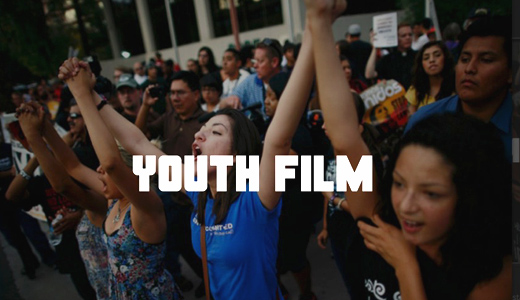
Mexican-American civil rights and labor leader César Chávez once said, “To make a great dream come true, the first requirement is a great capacity to dream; the second is persistence.” The spirit of this quote was evoked in full force for the 20th anniversary of the East L.A. Chicano Film Festival, now titled the Chicano International Film Festival (ChIFF), that took place September 10th and 11th. What began in 1995 as a small program to help Chicana/o film makers who had been rejected from mainstream film festivals get a venue for their work, through persistence and dedication has grown into a popular festival that supplies the perspective of Chicana/o culture and the diversity of Chicana/o film.
As the official origin story of the festival explains, the program has ” empowered those individuals and organizations whose films personify and humanize the Chicana/o and Raza experience to those who would otherwise not be familiar with it.” As well, they want “to inspire Chicana/o and Raza youth into looking at careers in the film, television and video industry.”
The festival’s weekend took place in two locations, Plaza De La Raza– a cultural center for the arts and education- on Saturday, and at ArcLight Hollywood- a 14-screen multiplex- on Sunday. The weekend consisted of film screenings in a variety of categories. Categories included: narrative feature, narrative short, documentary feature, documentary short, LGBTQ film, avant-garde film, student film, youth film, and music videos. The festival also included an art exhibit entitled “Chican@ Experience”. In addition, discussion panels touched upon issues affecting Latino inclusion and success in the film and entertainment industry. Connecting entertainment to representation and community power, the weekend highlighted the triumphs of Chicana/o creativity while addressing the continued need to fight for inclusion and diversity.
At the panel entitled “The Rise of the Chicano Voice in Los Angeles,” participants discussed the changing environment that aspiring Chicana/o film makers find themselves in, along with the power of the Mexican-American community not only in the industry around Hollywood, but in movements for social change. Panelist Guillermo Aviles-Rodriguez, a lecturer in the Chicana/o Studies Department at California State University, Northridge and Ph.D. student in UCLA’s School of Theatre, Film and Television, stated that there has been a “demographic explosion” of the Latino people and that there needs to be an embracing of power by the community. “This type of event [ChIFF] is an amazing way to affect change,” Aviles-Rodriguez went on to say. “Hollywood will pay attention. Latinos go to see these movies. That’s a lot of power.”
Another panelist, Dr. Alvaro Huerta, explained that the lack of opportunities leads to the lack of Chicana/o people in the entertainment industry. “We haven’t had the opportunities to be great filmmakers, artists, etc. The schools are segregated.” Aviles-Rodriguez seconded this assertion, emphasizing the need to recruit and train the next generation. The lecturer went further to note that films and projects showing Chicana/o culture need to have a message within them and show the layers and growth of the community. “Chicano doesn’t have a fixed definition. 1950 is different than 2016. That flux is something that is powerful. If you’re going to make a Chicano cake, activism better be a big part of that recipe. You can’t forget where you come from.”
Speaking with People’s World after the panel, Aviles-Rodriguez explained his notion of community power. “An important element when it comes to the issue of increasing representation and diversity in film and television is that what we see as a self-sufficient entertainment industry is actually quite dependent on the will of the masses,” he said. “If we truly want diversity then we must necessarily stop buying and supporting homogeneity. Looking at the rhetorical question of why the Oscars are so White-It is because that is what we have been investing our dollars of color into. All people-even people of color-get what they pay for.”
In a panel called “Digital Media Revolution,” representatives of two youth based programs, Soul Rebel Radio and Baktun12, presented opportunities for youth of color to break into the entertainment industry and find a voice. Soul Rebel Radio, a radio collective composed of college students, environmentalists, community activists, and entertainers in the Los Angeles area and Latin America talked about their self-produced monthly shows on the KPFK station. Soul Rebel Radio collective members said they focus on inspiring youth on issues such as “the prison industrial complex, militarization of our schools, domestic violence, the war on Iraq and in our urban communities, police brutality and much more through skits, satire, spoken word, original music, and news reports.” They encouraged youth and students who were interested in learning to come down to the KPFK station every Sunday at 6pm to learn more on how they could get their voice on the radio.
Baktun12, an East Salinas, Calif. based collective that uses story-based community engagement and cultural programming, performed a reading of their piece “In a Democratic Hustle,” a play dealing with the upcoming elections and the effect on the Latino community. A director of Baktun12, Luis ‘Xago’ Juarez, explained after the performance that there always needs to be a message in creative works, especially for communities of color. “Mainstream media leaves people empty,” Juarez said.
At the panel for “Increasing Visibility and Engaging Audiences with Latina/o Film,” ChIFF founder Jaime Segall-Gutierrez stated that, “film is the most powerful medium in the world. Our community needs to use that.” Gutierrez, who is a prominent Civil Rights Attorney based in Los Angeles, who practices Federal Civil Rights throughout the Southwest United States, particularly in the areas of police and border patrol brutality, added, “Unity is force. [There is] powerful unity in the arts. [ChIFF] isn’t art for the sake of art ladies and gentlemen. It’s about inspiring a movement. We’re in a different time now. We’re dealing with a revolution in social media. This [ChIFF] is part of a movement.”
This year’s ChIFF Impact award recipient was Chicana playwright and founder of Casa 0101 Theater in Boyle Heights, Josefina Lopez (“Real Women have Curves”). In an interview that can be found on the ChIFF festival website, Lopez spoke on the need for Latina/o inclusion in the arts by stating, “We must speak up, because we are the epitome of the 99 percent.”
A list and trailers of the films and category winners can be found here.









Comments